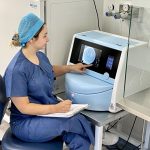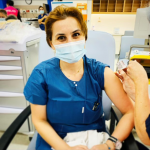Getting the timing right to maximise your chances to conceive naturally
Many people don’t realise just how low the chances of conceiving naturally are each month. For women aged 25 – 35, on average, there is a 20 percent chance of getting pregnant in each cycle. Within the first 12 months of trying, 85 – 90 percent of couples of this age will conceive. The chance of conceiving declines markedly for women between the ages of 38 and 42.
Knowing when you ovulate makes it much easier to maximise your chance of getting pregnant. This is because nearly all pregnancies are conceived in the six day period preceding your ovulation (and most are conceived if you have sex on the one or two days immediately preceding ovulation). The exact day of ovulation however can vary from one month to another for most women, despite having a regular cycle and this can make getting the exact timing right challenging. So, having intercourse every two to three days throughout the fertile window will increase your chance of pregnancy. Here are some of the ways you can try to work out when this fertile window is for you.
Monitor your body’s physical signs of ovulation and remember that you should be trying to have sex in the week BEFORE ovulation:
Cervical mucus changes:
The amount of cervical mucus and what it looks and feels like varies from woman to woman. But generally, as you near ovulation your body produces more estrogen, causing cervical mucus to become stretchy and clear (like egg white), which helps sperm swim to the egg (oocyte).
Breast soreness or tenderness:
Breast and nipple sensitivity, tenderness or soreness can be another sign of ovulation, thanks to the rush of hormones entering your body right before and after ovulation.
Mild pelvic or lower abdominal pain:
Some women can actually feel ovulation – typically as a mild ache or pain in the lower abdomen, usually on one side or the other (not the same side each time). The sensation, called ‘Mittelschmerz’, can last anywhere between a few minutes to a few hours. You might also experience light vaginal bleeding, discharge or nausea along with the ache or pain, which is usually mild and short lived.
Libido changes:
Some women notice that their sex drive (libido) increases during ovulation, which might be Mother Nature’s way of ensuring we keep the species alive and well.
Heightened sense of smell:
For some women, a more sensitive sense of smell in the latter half of a normal menstruation cycle can be a sign of ovulation. In this fertile phase, your body is primed to be more attracted to the male pheromone androstenone.
Track ovulation:
Menstrual charting:
A simple and inexpensive way to track ovulation is to record the day your period begins and ends for several months. If you have normal menstrual cycles of between 25 and 35 days – you’re likely to be ovulating regularly, with ovulation occurring about 14 days before menstruation (your period). Make sure to record whenever you experience potential physical signs of ovulation mentioned already along with any fluid retention or changes in appetite or mood.
If you want a slightly more accurate ovulation calendar, consider using a fertility or ovulation app on your smartphone. The fertility apps that ask for your basal body temperature and other fertile signs are thought to be the most accurate.
Ovulation kit:
Ovulation predictor kits are available over the counter from the Pharmacy and some supermarkets. These kits measure the level of luteinizing hormone (LH) in your urine. This is useful because ovulation typically occurs about 10 to 12 hours after your LH levels peak – generally on day 14 to 15 of the menstrual cycle if your cycle is 28 days long. Your LH concentration should stay elevated for 14 to 27 hours to allow for full maturation of the egg (oocyte).
When to seek help from a doctor?
The reality is it can take normal, healthy women many months to conceive. There are varied reasons why you may not get pregnant, even if you have been tracking your most fertile time each month. So keep trying. If the female in the relationship is 35 years of age or younger and you have been trying to conceive by having regular, unprotected sex for twelve months then it is advisable to go see a General Practitioner (GP) to start investigating your fertility. If the female in the relationship is over 35 years of age you should make this appointment after 6 months of trying. If you have a known past fertility problem or there is a clinical likelihood either partner has a fertility problem, it is best to seek assistance early.
Early and accurate investigation of fertility is essential to give you the best chance of either maximising your chance of conceiving naturally or seeking assistance with assisted reproductive technologies, such as IVF. If you are experiencing difficulty conceiving and would like to talk to an expert – contact our team at Westmead Fertility Centre for more information
All content should be considered as opinion only. Always seek the direct advice of your doctor in connection with any questions or issues you may have.
















